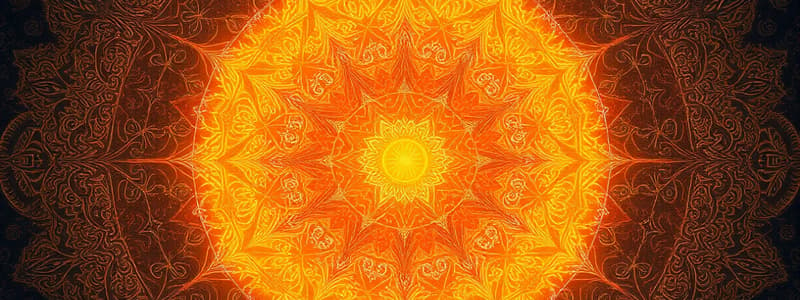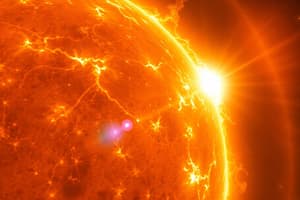Podcast
Questions and Answers
What is the primary source of energy that allows the Sun to shine for billions of years?
What is the primary source of energy that allows the Sun to shine for billions of years?
- Nuclear potential energy (correct)
- Gravitational potential energy
- Chemical energy
- Thermal energy
What does gravitational equilibrium in the Sun help maintain?
What does gravitational equilibrium in the Sun help maintain?
- A stable chemical composition
- Continuous expansion of solar mass
- Balance between gravity and fusion pressure (correct)
- Increased surface temperature
How long can the chemical energy content of the Sun sustain its luminosity?
How long can the chemical energy content of the Sun sustain its luminosity?
- 10,000 years (correct)
- 10 billion years
- 1 billion years
- 25 million years
What ensures that the Sun is not contracting over time?
What ensures that the Sun is not contracting over time?
Which of the following statements is NOT true about the Sun's luminosity?
Which of the following statements is NOT true about the Sun's luminosity?
What is the significant fate of the Sun given its current energy source?
What is the significant fate of the Sun given its current energy source?
Which is the correct relationship concerning the Sun's energy balance?
Which is the correct relationship concerning the Sun's energy balance?
What is the particle that fuses into helium in the Sun?
What is the particle that fuses into helium in the Sun?
What product is formed when four protons fuse together in the Sun?
What product is formed when four protons fuse together in the Sun?
Why can the Sun be classified as in hydrostatic equilibrium?
Why can the Sun be classified as in hydrostatic equilibrium?
Which equation describes the energy released during the fusion of hydrogen into helium?
Which equation describes the energy released during the fusion of hydrogen into helium?
What is the primary source of energy that allows the Sun to shine?
What is the primary source of energy that allows the Sun to shine?
How much energy is approximately released when four protons fuse into one helium nucleus?
How much energy is approximately released when four protons fuse into one helium nucleus?
Which layer of the Sun is where nuclear fusion occurs?
Which layer of the Sun is where nuclear fusion occurs?
What happens to the core of the Sun when the temperature declines?
What happens to the core of the Sun when the temperature declines?
At what temperature does the Sun's corona exist?
At what temperature does the Sun's corona exist?
What mechanism primarily transports energy through the radiation zone?
What mechanism primarily transports energy through the radiation zone?
What byproducts are released alongside the helium nucleus during fusion?
What byproducts are released alongside the helium nucleus during fusion?
Why is there a decrease in total mass during the fusion of protons into helium?
Why is there a decrease in total mass during the fusion of protons into helium?
How long does it take for the Sun to rotate once at its equator?
How long does it take for the Sun to rotate once at its equator?
What is the approximate radius of the Sun compared to Earth?
What is the approximate radius of the Sun compared to Earth?
What is the primary fuel for nuclear fusion in the Sun?
What is the primary fuel for nuclear fusion in the Sun?
Which of the following correctly describes the photosphere?
Which of the following correctly describes the photosphere?
What defines the solar wind?
What defines the solar wind?
What is one method used to understand the interior of the Sun?
What is one method used to understand the interior of the Sun?
How does gravitational equilibrium affect nuclear fusion in the Sun?
How does gravitational equilibrium affect nuclear fusion in the Sun?
What role do solar neutrinos play in studying the Sun?
What role do solar neutrinos play in studying the Sun?
What is the primary cause of energy transport in the radiation zone of the Sun?
What is the primary cause of energy transport in the radiation zone of the Sun?
What problem was encountered in early searches for solar neutrinos?
What problem was encountered in early searches for solar neutrinos?
What is suggested by the agreement between mathematical models and observations of solar vibrations?
What is suggested by the agreement between mathematical models and observations of solar vibrations?
What process occurs in the core of the Sun?
What process occurs in the core of the Sun?
What does hot plasma do in the convection zone of the Sun?
What does hot plasma do in the convection zone of the Sun?
What causes solar activity?
What causes solar activity?
How frequently does solar activity rise and fall?
How frequently does solar activity rise and fall?
What force prevents the particles in a star from flying apart?
What force prevents the particles in a star from flying apart?
What contributes to a star not collapsing?
What contributes to a star not collapsing?
What would likely happen if the rate of hydrogen fusion in a star were to increase?
What would likely happen if the rate of hydrogen fusion in a star were to increase?
For a star to maintain equilibrium, there must be a balance between the rate of energy generated and the energy lost, specifically related to what?
For a star to maintain equilibrium, there must be a balance between the rate of energy generated and the energy lost, specifically related to what?
Which of the following statements about solar activity is true?
Which of the following statements about solar activity is true?
What is NOT a cause of solar activity?
What is NOT a cause of solar activity?
Flashcards are hidden until you start studying
Study Notes
Sun's Energy Source
- The Sun's energy is not from fire or contraction
- The Sun shines because of nuclear fusion in its core
- Nuclear fusion converts hydrogen into helium, releasing a huge amount of energy
- The process is called the proton-proton chain
Sun's Stability
- The Sun is in gravitational equilibrium, where the force of gravity inward is balanced by the outward pressure from the hot gas
- The Sun maintains its energy balance because fusion in the core provides energy at the same rate it radiates outwards
- The Sun's core temperature is about 15 million Kelvin
Sun's Structure
- The Sun has a layered structure, with each layer having different properties
- core: where nuclear fusion happens, producing the Sun's energy
- radiation zone: energy is transported outward by photons
- convection zone: energy is transported upward by rising hot gas
- photosphere: visible surface of the Sun, where the plasma becomes transparent
- chromosphere: middle layer of the solar atmosphere
- corona: outermost layer of the solar atmosphere
Sun's Properties
- Radius: 6.9 x 10^8 meters (109 times Earth)
- Mass: 2 x 10^30 kg (300,000 Earths)
- Luminosity: 3.8 x 10^26 watts
- Rotation: 25 days at the equator, 30 days at the poles
Solar Activity
- Solar activity is caused by stretching and twisting of magnetic field lines near the Sun's surface
- Solar activity varies with an 11-year cycle
Solar Thermostat
- The Sun acts as a thermostat, regulating its core temperature
- If the core temperature decreases, the fusion rate drops, causing the core to contract and heat up
- If the core temperature increases, the fusion rate rises, causing the core to expand and cool down.
Understanding the Sun’s Interior
- Solar vibrations can be observed, providing information about the Sun's internal structure
- Solar neutrinos are created during fusion and travel directly through the Sun, providing insights into the core
- Mathematical models of the Sun's interior match observations of solar vibrations and neutrinos
Energy Escape from the Sun
- Energy from the core takes a long time to escape the Sun
- Photons randomly bounce through the radiation zone, carrying energy outward
- Hot plasma rises in the convection zone, carrying energy to the photosphere
Solar Neutrinos
- Early observations of solar neutrinos found fewer neutrinos than predicted
- Later observations found more neutrinos, but some had changed form
Studying That Suits You
Use AI to generate personalized quizzes and flashcards to suit your learning preferences.




